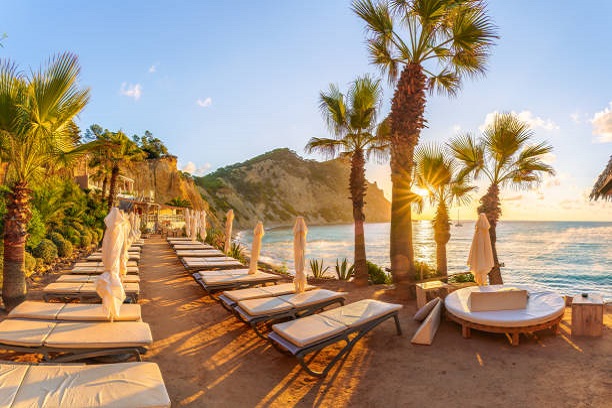
Eco-luxury travel has emerged as a sought-after trend for travelers who want indulgence without guilt. Resorts now integrate sustainable practices while maintaining five-star service, stunning interiors, and exceptional dining experiences for discerning guests worldwide.
This rise is fueled by increased awareness of climate change and environmental preservation. Luxury travelers now prioritize destinations that care for ecosystems while offering exclusive comforts, unique cultural immersion, and cutting-edge amenities aligned with sustainability goals.
Hotels and resorts are innovating with renewable energy, organic cuisine, eco-friendly architecture, and waste-reduction policies. This fusion of luxury and responsibility is shaping the future of tourism, proving that environmental care and indulgence can coexist seamlessly.
Many eco-luxury resorts are built with materials that blend into natural surroundings, reducing environmental impact. Structures often use reclaimed wood, bamboo, and locally sourced stone to harmonize with landscapes beautifully.
Architects design spaces to maximize natural light and ventilation, reducing energy consumption. Eco-conscious designs frequently incorporate solar panels, rainwater harvesting systems, and green roofs that help regulate temperature and promote biodiversity in surrounding habitats.
Resorts focus on minimal land disturbance during construction. Designs prioritize open-air spaces, allowing guests to enjoy stunning views while maintaining a low carbon footprint and preserving the delicate ecosystems in their immediate environment.
Eco-luxury resorts increasingly rely on renewable energy sources like solar, wind, and hydropower. These innovations reduce carbon emissions while providing consistent, clean power for guest accommodations, facilities, and recreational areas.
Solar-powered heating and lighting systems ensure energy efficiency without sacrificing guest comfort. Some resorts even use biomass energy derived from organic waste, demonstrating a full-circle approach to sustainable living and energy use.
By investing in renewable infrastructure, these destinations lower operational costs long-term. This also allows them to market their eco-credentials to environmentally aware travelers seeking meaningful ways to support sustainable tourism through their holiday choices.
Gourmet experiences at eco-luxury resorts often focus on organic, locally sourced ingredients. Chefs partner with nearby farmers, fishermen, and producers to craft menus that reflect seasonal availability and regional culinary traditions.
Locally sourced dining minimizes transportation emissions while supporting community livelihoods. Resorts also maintain on-site gardens or greenhouses, allowing guests to enjoy fresh herbs, fruits, and vegetables harvested directly from the property.
Menus often highlight plant-based dishes, reducing the environmental footprint of meat production. Guests experience culinary excellence while learning how mindful food sourcing can positively impact the planet and the local economy simultaneously.
Water management is crucial for eco-luxury resorts, especially in regions prone to drought. These properties adopt rainwater harvesting systems, greywater recycling, and low-flow fixtures to minimize consumption without compromising guest experience.
Landscaping uses native, drought-resistant plants requiring minimal irrigation. Pools and spas are designed with advanced filtration systems, reducing water waste and the need for chemical-heavy treatments that harm the environment.
Guests are encouraged to participate in conservation efforts through educational signage and optional towel reuse programs. This interactive approach enhances awareness and fosters respect for water resources among travelers.
Many eco-luxury resorts are located near wildlife habitats, making conservation a core mission. They partner with local organizations to protect endangered species and support biodiversity through habitat restoration projects.
Guests can participate in guided eco-tours, learning about local flora and fauna while understanding the impact of human activities on ecosystems. This immersive approach builds empathy and inspires future conservation actions.
Resorts often contribute a portion of profits to environmental causes, ensuring that tourism revenue benefits conservation. This creates a sustainable loop where nature protection and economic prosperity coexist harmoniously.
Eco-luxury resorts prioritize empowering local communities. They hire staff from nearby villages, offer training programs, and source goods from local artisans, creating a positive economic impact beyond the property’s boundaries.
Community-based tourism initiatives allow guests to interact with locals through cultural workshops, traditional cooking classes, and storytelling sessions. This fosters mutual respect and deeper cultural appreciation between travelers and residents.
Such engagement ensures that tourism supports community development rather than exploitation. Sustainable travel becomes a tool for social empowerment, preserving cultural heritage while providing financial opportunities for marginalized populations.
To achieve zero waste, eco-luxury resorts implement composting, recycling, and upcycling programs. Single-use plastics are replaced with biodegradable or reusable alternatives, reducing harmful environmental pollutants significantly.
Food waste is minimized through precise portion planning and donations to local charities. Even construction waste is repurposed creatively, such as turning old wood into decorative furniture pieces.
Guests are encouraged to adopt eco-friendly habits during their stay, reinforcing a shared responsibility for waste reduction. This collective approach fosters long-term behavioral change beyond the vacation experience.
Eco-luxury resorts integrate wellness into their sustainability approach. Yoga pavilions, meditation gardens, and organic spa treatments provide rejuvenation while aligning with holistic principles that honor the environment.
Treatments often use locally sourced herbal oils and natural therapies rooted in traditional healing practices. This connection to place enhances the authenticity and sustainability of the wellness offerings.
Mindful living workshops teach guests practices like forest bathing, mindful eating, and sustainable home habits, ensuring the positive impact of their stay extends into daily life back home.
From Asia’s lush rainforests to Africa’s savannahs, iconic eco-luxury resorts set the standard for sustainable elegance. Examples include Soneva Fushi in the Maldives and Singita Lebombo Lodge in South Africa.
These destinations blend natural beauty with personalized service, offering experiences such as snorkeling with marine biologists, safaris led by conservationists, and farm-to-table gourmet dining beneath the stars.
Such resorts demonstrate that environmental care need not compromise luxury. Instead, it enhances the experience, creating memories that inspire responsible travel choices for years to come.
As sustainability becomes a non-negotiable in hospitality, eco-luxury resorts will continue leading innovation. Emerging trends include carbon-neutral operations, regenerative tourism, and technology-driven energy optimization systems.
Travelers will increasingly expect transparency in sustainability efforts, prompting resorts to publish annual impact reports and engage guests in measurable conservation initiatives during their stay.
The future lies in blending high-end comfort with regenerative practices, ensuring that every journey not only leaves no trace but actively restores and enriches the environment for future generations.

This post has been published by the admin of our website, responsible for content management, quality checks, and providing valuable information to our users.


